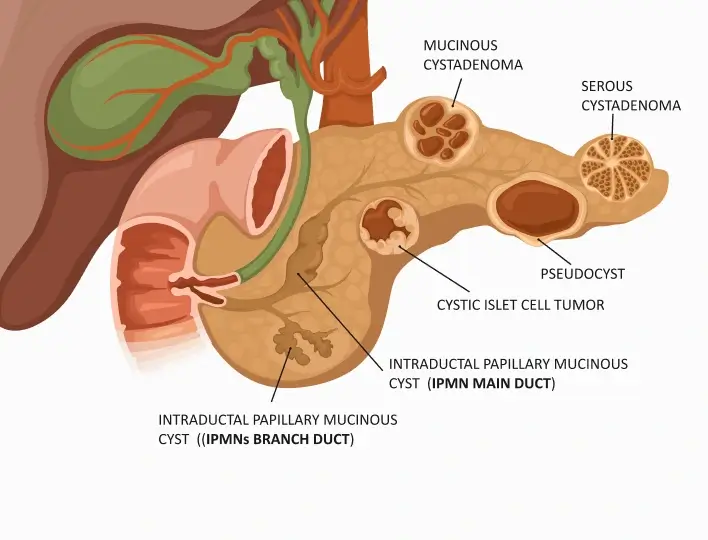Pancreas Conditions
Pancreatic Conditions We Specialise In
We provide personalised and effective care for a wide range of pancreatic conditions, from common issues to more complex concerns. Our goal is to offer accurate diagnosis, personalised treatment, and long-term support.
Pancreatic Cancer
Pancreatitis
Pancreatic Cysts
Pancreatic Cancer
Pancreatic Cancer
Pancreatic cancer occurs when abnormal cells in the pancreas grow uncontrollably and form a tumour. These changes begin in the DNA of pancreatic cells and can spread if not caught early.
What makes pancreatic cancer particularly dangerous is its tendency to develop silently—without obvious symptoms in its early stages.
Early signs to watch for include:
What makes pancreatic cancer particularly dangerous is its tendency to develop silently—without obvious symptoms in its early stages.
Early signs to watch for include:
Yellowing of the skin or eyes (jaundice)
New onset of diabetes, especially without weight gain
Unexplained weight loss or loss of appetite
Oily, pale stools that are difficult to flush
Tea-coloured urine
Itchy skin throughout the body
Nausea and vomiting
Abdominal or Back pain
Gallbladder or liver swelling
Two Main Types of Pancreatic Cancer
There are two main types of pancreatic cancer, depending on the type of cells involved:
Exocrine pancreatic cancer
This is the most common type of pancreatic cancer. It begins in the cells responsible for producing digestive enzymes and typically grows and spreads more aggressively. Most cases of pancreatic cancer fall into this category.
Endocrine pancreatic cancer
Also known as pancreatic neuroendocrine tumours (PNETs), this rarer type starts in the hormone-producing cells of the pancreas. These cancers often grow more slowly and may require different treatment approaches.
Did you know? In Singapore, pancreatic cancer is among the top 10 most common cancers and one of the leading causes of cancer-related deaths.
If any of these symptoms sound familiar, please seek medical attention promptly.
Pancreatitis
Pancreatitis is an inflammation of the pancreas that can appear suddenly (acute) or progress gradually over time (chronic).
Acute Pancreatitis
Often caused by gallstones or heavy alcohol use, acute pancreatitis comes on quickly and may cause:
- Severe upper abdominal pain (that may radiate to the back)
- Nausea and vomiting
- Fever
Chronic Pancreatitis
Chronic pancreatitis results from long-term inflammation and damage, often due to repeated acute episodes, alcohol use, or genetic conditions. Symptoms include:
- Persistent abdominal pain
- Fatty or oily stools
- Weight loss
- Poor blood sugar control
Pancreatic Cysts

Pancreatic Cysts
Pancreatic cysts are fluid-filled sacs within the pancreas. While many are benign and discovered incidentally, some cysts carry a risk of becoming cancerous over time.
Common types include:
Common types include:
Serous cystadenomas- usually harmless
Mucinous cystic neoplasms (MCNs)- potential to become malignant
Intraductal papillary mucinous neoplasms (IPMNs)- variable cancer risk
Monitoring is important. Depending on the type and size of the cyst, your doctor may recommend regular imaging or surgical removal.
Frequently Asked Questions
Is pancreatic cancer curable?
If caught early, pancreatic cancer may be treatable with surgery and other therapies. However, most cases are diagnosed at a later stage, which is why early detection is crucial.
Can pancreatitis lead to cancer?
Chronic pancreatitis is a known risk factor for pancreatic cancer, especially with long-term inflammation or genetic predispositions.
Is pancreatic cancer preventable?
While pancreatic cancer cannot be fully prevented, you can lower your risk by maintaining a healthy weight, avoiding tobacco, and limiting alcohol intake. If you have risk factors—such as a family history or chronic pancreatitis—speak to your doctor about whether screening may be appropriate.
How do you screen for pancreatic cancer?
There is no standard screening for pancreatic cancer in people at average risk. For high-risk individuals, doctors may recommend an initial diagnostic test using imaging methods such as MRI, MRCP (magnetic resonance cholangiopancreatography), or endoscopic ultrasound (EUS).
message Us
Our Clinic Location:
Mount Elizabeth Medical Centre
#08-07, 3 Mount Elizabeth, Singapore 228510
| Tel | : 6454 0054 |
| Fax | : 6764 0054 |
| : ask@surgicalassociates.sg |
Opening Hours:
| Mon to Fri | : 9am to 5pm |
| Sat | : 9am to 1pm |
| Sun & PH | : By Appointment Only |